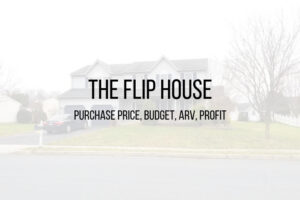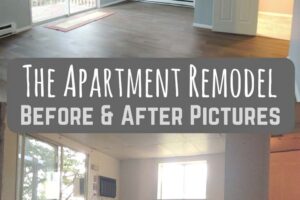This post, how to buy a rental property, has been a long time in the making. The kick in the butt I needed to get this finished and posted was from a friend who became interested in purchasing a rental property.
She asked if I had any blog posts on the topic of purchasing a rental property, running the numbers on a rental or anything else that might guide her in the right direction.
So here it is! In this post I’m going to go over choosing your market, working with an agent, finding and funding a deal and most importantly how to run the numbers aka how to analyze a rental property.

Choose Your Market
First things first, you want to decide on an area. Being too broad can confuse things and make the task of searching for an investment property overwhelming. Why? Because in order to “run the numbers” on a potential investment property you need to know what fair market rents are for the area, what the demographic is like, what type of apartments are renting quickly and for the most money. For example, are apartments without washers and dryers sitting on the market longer than those that include a washer/dryer? Are apartments with only street parking renting for less than those with designated spaces?
This market research could be done for each market every time you come across a potential rental to purchase, but for those just beginning it might be helpful to choose 1 (or even a few) markets to focus on, research the heck out of them and look for rental properties within those markets.
Find an Agent Who Knows Their Shit
Most agents work solely off commission. Some agents will do anything to close a deal in order to get paid, even if it’s not in your best interest to purchase a property. And only a few agents actually know how to help clients find a good investment. This is obviously just one person’s, albeit a licensed real estate agent’s opinion, on this topic but I’ve come across these complaints too many times not to point it out.
As a buyer, it doesn’t cost you anything to use a real estate agent because the buyer agent and seller agent commission is paid by the seller. But don’t go picking any old agent, it’s imperative to find one who can help you with the investment you want to make. Most agents are out there selling “retail” homes to regular buyers who are simply looking for a home – not much thought is put into whether it’s a good investment.
Bottom line is find an agent who can help you run numbers, someone who knows all the true costs involved with owning a rental property – better yet, find an agent who invests themselves!
Find The Money and Find the Deal
Finding money and finding a deal is kind of like “the chicken and the egg scenario,” people have differing opinions on which one to find first. My opinion is search for both the funding and the deal at the same time and whichever happens first, great, then focus on the other.
You can find money in an unlimited amount of places. The most common is saving for a down payment and getting a mortgage. But there are other places money can be hiding like with friends, family and private investors. The main thing here is to start talking about what you want to accomplish in real estate. Everyone wants to be involved with real estate and if they find out you’re serious, know what you’re doing and they trust you they might just get involved with your real estate investing.
An important thing to note is that most agents won’t show properties to a buyer without a pre-approval or pre-qualification. If you’re using private money from friends or family you won’t have an official pre-approval so you’ll need to come up with something else to prove you’re serious and not wasting an agent’s time running around showing you properties. (Remember, agents work off commission and don’t get paid for running to show properties until you close on one.) This “proof” could be a simple letter of intent from your partner stating they are willing to fund a deal or a copy of their latest bank statement proving they have the cash (or their pre-approval if they are getting a mortgage.) Or maybe you’re close with your agent and just communicating your plans to use private money is good enough for them… it all depends on the agent.

Run The Numbers
Once you’ve found a property that you think might be worth investigating further, you’ll need to run some numbers. You can do a rough estimate of this without even seeing the property.
Figure out the potential rental income
You’ll first need to figure out what the property would rent for. Look at sites like apartments.com, trulia.com, zillow.com and even craigslist.org to see what other similar sized apartments are renting for. You can also use rentometer.com to help back up your opinion of what the property should rent for. Make sure to take into consideration all of the following:
- What utilities are included?
- Is there laundry in unit or on site?
- Is there off street parking?
- Is the rental upgraded?
- Is it located near public transit, schools, shopping?
Rehab/Repair Budget
If you plan on doing one of my favorite real estate strategies, the BRRRR strategy, then you’ll need to come up with a budget for the rehab. This can be difficult without looking at the property but you can get a good idea just through pictures. If it looks like it will need a total rehab with a new kitchen(s), bathroom(s), new flooring and paint throughout, etc. then you might get away with using a basic per square foot calculation. In my area a rental rehab can be anywhere from $18-$25 a square foot. So take the total square footage of all units on the property and multiply by a number somewhere between 18 and 25.
The rehab budget will depend on whether you’re doing some work yourself, what items you plan on subbing out, and how “high-end” you plan on rehabbing the unit(s).
Figure Out Monthly Expenses
This is where an investor friendly real estate agent comes in handy. I can’t tell you how many times I’ve seen rental properties listed where the listing agent incorrectly calculates potential income. It’s not as simple as taking the total rental income and subtracting out the mortgage, taxes and insurance. No no no. There are so many more expenses involved including:
- Mortgage/loan expense
- Property taxes
- Property insurance
- Utilities like electricity or gas
- Water/sewer bills
- Trash removal
- Lawn care
- Snow removal
- Capital Expenditures (5%-10%)
- Maintenance expenses (5%)
- Vacancy expenses (5%-10%)
- Management expenses (8%-12%)
You may or may not have some expenses above, especially if you pass them off to the tenant (maybe you have the tenants take care of the lawn or do snow removal) but you should always include them in your analysis – other investors are doing the same thing. And what happens when the tenant doesn’t cut the grass and you’re threatened with a letter from the city… are you going to lug a mower over to the property or pay someone else to do it?
Capital expenditures, or cap-ex, is what you’ll be socking away each month to pay for the big ticket items that the property will inevitably need like a new roof, new windows, new heat/ac system, new appliances (if you supply them) and other similar items like that. The older the property the larger percentage of the monthly rental income you’ll want to put aside.
Vacancy expense is another calculation most people forget to include in their calculations. It’s inevitable that you’ll have a vacancy at some point and this needs to be taken into consideration when running numbers.
It’s also important to note that management expenses should be calculated into your monthly costs, I can’t tell you how many people don’t include this because they plan on managing the rental(s) themselves. This is important for so many reasons. First, you might not always want to or be able to manage your own rentals, so when the time comes to sub out that part of your business you need to make sure you’ll still profit from your investment after paying a management company. Secondly, if you decide to sell or unexpectedly need to sell, you better believe the next investor is going to take into account management expenses when running their numbers.
Running the numbers is the most important thing to do when analyzing a deal. The reason there are so many failed landlords out there is because they severely underestimated the costs involved with owning a rental property. Not taking into consideration all the expenses listed above can lead to financial ruin. When it comes to investing in real estate trust the numbers- NOT your gut.
Subscribe
Be sure to reach out on Instagram,Facebook and Pinterest and subscribe to this blog to be notified when new blog posts are up – who would want to miss those!?! (And if you’re a fellow blogger submit your website! I love finding new blogs to read, pin and share!!! It’s so hard to find a good quality blog nowadays, you know what I’m saying?)
[contact-form-7 id=”3255″ title=”Contact form 1″]




